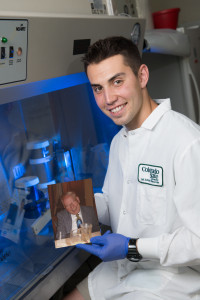 The disease that ended his grandfather’s life has shaped student Lukas Foster’s in a different way.
The disease that ended his grandfather’s life has shaped student Lukas Foster’s in a different way.
Parkinson’s disease hits close to home for Foster, a Colorado State University biomedical sciences major whose grandfather, Willie Bandorf, suffered from the progressive neurological disorder. So he was the one person Foster wished he could tell when he earned a Best in Show award at CSU’s 2014 student research competition for his study of Parkinson’s.
“His eyes would light up whenever I talked about my research,” said Foster, whose project is supported with funding from the Michael J. Fox Foundation for Parkinson’s Research.
“He loved that I was learning about Parkinson’s disease and working towards a positive change for others affected by it,” said Foster, a senior in theCollege of Veterinary Medicine and Biomedical Sciences. “He told me to always think of him.”
Parkinson’s disease – affecting an estimated 1 million people in the United States – cannot be cured. Rather, treatments aim to control tremors and other movement impairments that characterize the disease; physical therapy, medication and deep brain stimulation are among the therapies used, even as scientists explore stem-cell therapy and other novel possibilities.
Quest for improved treatment
Foster’s winning project, “A novel diindolylmethane analog, DIM-C-pPhBr, suppresses neuroinflammatory gene expression in BV-2 microglia cells,” represents the quest for improved treatment: It examines compounds that hold potential for quelling neuroinflammation, which has been found to have a role in progression of Parkinson’s disease.
Foster displayed his research findings at the 2014 CSU Celebrate Undergraduate Research and Creativity showcase. He was one of just three students to earn the Best in Show honor among more than 200 total participants whose research posters were judged.
“With this research, we could find a way to delay symptoms of Parkinson’s disease to the point where people may have it at the time of their death, but it won’t have a great impact on them,” Foster said, reflecting on his grandfather’s dramatically impeded speech and mobility.
Foster has worked in the laboratory of Ronald Tjalkens, a professor of toxicology and neuroscience whose research into Parkinson’s disease is supported by the Michael J. Fox Foundation and National Institutes of Health.
Tjalkens said he recently presented data from his lab’s research to the Michael J. Fox Foundation in New York.
“It was extremely well received because of the clear implications for improving therapy for Parkinson’s patients,” Tjalkens said. “I have every confidence that Lukas will continue to be a valuable team member on this important project.
“It is uncommon for an undergraduate student to be performing at this level so early in their college career, but he has been a tremendous contributor to the success of this project,” Tjalkens added.
Extensive research possibilities
Foster, who plans to attend medical school, applied to work in the Tjalkens laboratory as a freshman. His passion for understanding Parkinson’s disease made it a natural fit.
“I find it most interesting that nobody knows what causes Parkinson’s diseases or how to cure it,” Foster said. “The research possibilities are endless. It’s an open book for new discoveries being made and real solutions developing.”
When he began his research, Foster eagerly shared his experiences with his grandfather, who died in January 2013. Bandorf could not speak, but showed his support with thumbs-up gestures.
“I knew I was making him proud,” Foster said, smiling. “I understand more and more how this disease affected his life. I’m putting the pieces together to understand the pathway of neurodegeneration and thinking of him every step of the way.”